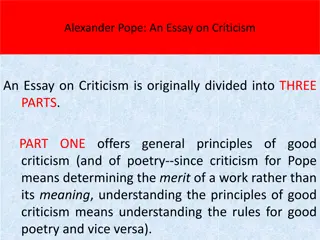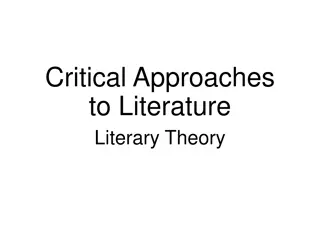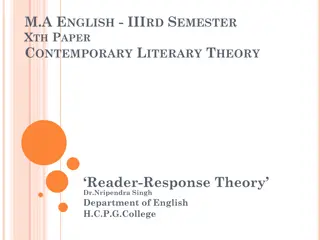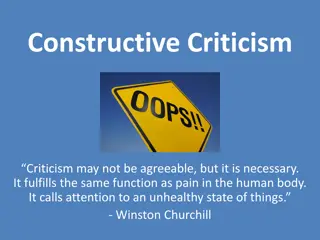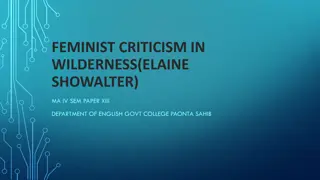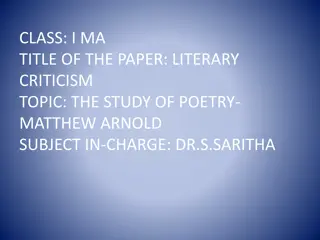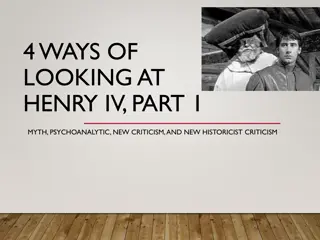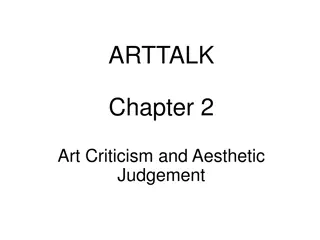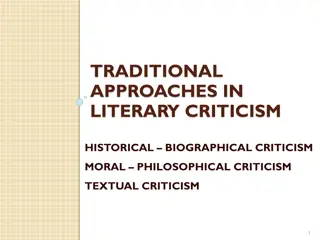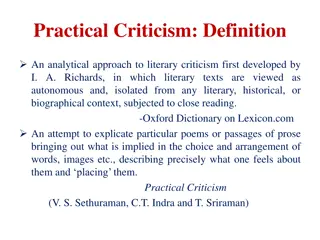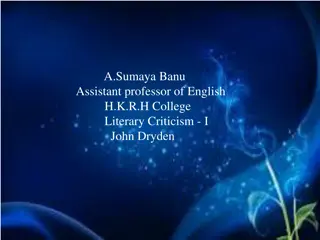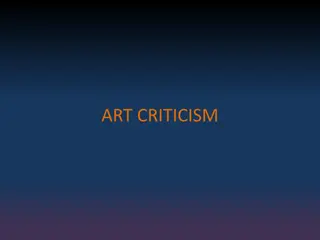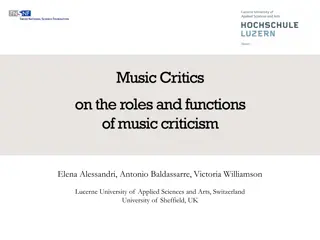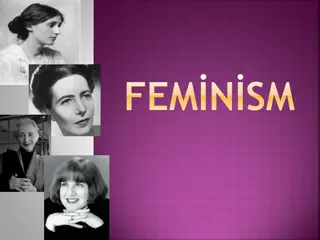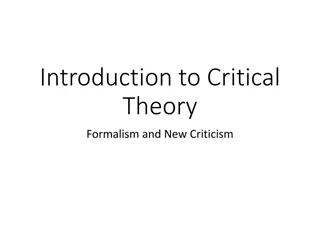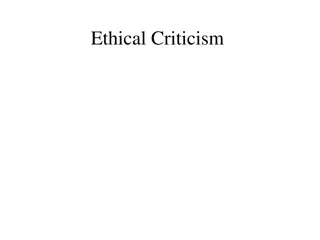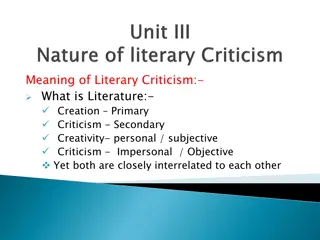Understanding Literary Criticism: A Comprehensive Overview
Literary criticism involves the study, evaluation, and interpretation of literature, focusing on themes, styles, settings, and historical contexts. This discipline explores the meanings, workings, and values of literary works through interpretation, analysis, and evaluation. Various types of literary criticism, such as formalist, feminist, reader-response, archetypal, and Marxist approaches, offer different perspectives for analyzing and understanding literature. Additionally, literary theory provides methods for interpreting and analyzing texts from diverse perspectives.
Download Presentation

Please find below an Image/Link to download the presentation.
The content on the website is provided AS IS for your information and personal use only. It may not be sold, licensed, or shared on other websites without obtaining consent from the author. Download presentation by click this link. If you encounter any issues during the download, it is possible that the publisher has removed the file from their server.
E N D
Presentation Transcript
Literary Criticism by M.R.Vijaya bhaarathy Assistant Professor Swami Vivekanandha arts & science college vallam , thanjavur.
Literary criticism is the study evaluation and interpretation of literature. Literary criticism is essentially an opinion supported by evidence, relating to theme style, setting or historical or political context. The term criticism derives from the Greek term kritikos which was used in the 4thcentury B.C .it means a judge of literature .
The discipline of interpreting , analyzing, and evaluating literature long standing texts with timeless values, values, universal themes & exceptional artistry and power Interpret:-What does this work of literature mean? Analyze:- how does this piece of literature WORK? Evaluate:- what is this works VALUE?
Types of literary criticism There are many different types of literary criticism, but we ll be studying these 5 closely. Formalist Feminist Reader response Archetypal Marxist
Feminist : Women s roles, and how women are portrayed in literature. Formalist : Each writing is independent of others no history is used to determine meaning ; there are no outside connections to other texts.
Historical :- looks at the time period the literature was written in. Psychological:- built on Freud s theories of unconscious, desires and defenses. Sociological:- literature in the cultural, economic and political context in which it is written
literary theory :- Literary theory is the ideas and methods we use to interpret and analyze literature from a variety of perspectives. Literary theory is simply the the term used for A Particular way of reading viewing texts or looking at a text from a particular point of view (or) reading a text from different perspective
We use literary theory in:- Literary theory formulates the relationship between author and work. It does not explain meaning of a literary work but ideas and theories which could result in that literary work. It studies not only the individual and circumstances and overall the culture in which it is written.
Difference between literary theory and literary criticism: Literary theory can be defined simply as the various methods we use to analyze and understand literature. ... Literary criticism, on the other hand, is the practical application of those theories or methods to particular works of literature--the actual use of a method to better understand a text's meaning.
Father of literary criticism Dryden Dryden was considered to be the "father of English criticism" by Samuel Johnson precisely because he contributed so much to the ouevre of literary criticism in the canon of English literature. father of New Criticism I.A. Richards's 1929: I.A. Richards's Practical Criticism: A Study of Literary Judgment. Richards has been called the father of New Criticism. He was one of the first to study literary interpretation as a kind of science.
QUOTES Our reaction to advertising is really a form of literary criticism The point of literary criticism in anthropology is not to replace research, but to find out how it is that we are persuasive. Literary criticism is generally bunk. Nonsense. Usually based on self-serving post-intellectual bullshit.
Strict rules of evidence would destroy psychoanalysis and literary criticism. I still found literary to be a suspect activity All good criticism should be judged the way art is. You shouldn t read it the way you read history or science. Literary criticism now is all pranks and polemics. Every literary critic believes he will outwit history and have the last word.
Importance of literary criticism Appreciation towards a certain literary piece. Understanding reality from fiction. Stimulate emotional responses. Evaluation literary works involves two kinds of judgement: 1.Assessment of quality and value. 2.Assessment of cultural, social and moral values they display.
Literary criticism has probably existed for as long as literature Later classical and medieval criticism often focused on religious texts, and the several long religious traditions The reader can focus on an aspect as his interest toward the literary work.
Examples of literary criticism F. Scott Fitzgerald s The Great Gatsby William Golding s Lord of the Flies Charlotte Perkins Gilman s The Yellow Wallpaper Nathaniel Hawthorne s Young Goodman Brown Victor Fleming s The Wizard of Oz


